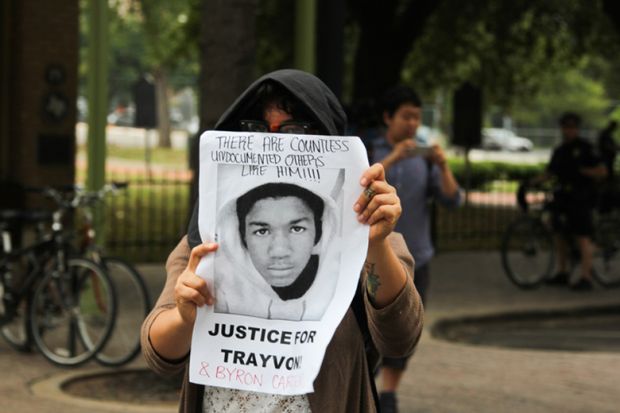Black Lives Matter, the social movement, and #BlackLivesMatter, the social media brand, emerged after the acquittal of Trayvon Martin’s killer in 2013. The evidence revealed an unarmed teenager shot dead by an armed man. What made the verdict unsurprising was that Martin was black and his killer white. #BlackLivesMatter quickly became the focus for the anger felt at the regularity with which tragedies such as Martin’s death recur.
Christopher Lebron’s short, incisive book examines the racialised violence that defines US history: from the overt violence of slavery to the racial segregation of Jim Crow legislation, from white supremacist lynchings to the covert white privilege of society today. Lebron argues that this violence found a natural home in Donald Trump’s 2016 election campaign. This perspective is corroborated by the seeming impunity felt by heavily armed white supremacists chanting “Hail Trump” while making Nazi salutes in Charlottesville last month.
Lebron places this continuum of black oppression within other continua of black protest and black political and cultural thought. Deploying the voices of earlier activists, artists and thinkers, he situates #BlackLivesMatter as the most recent manifestation of long-standing protest. When Kendrick Lamar sang Alright atop a graffiti-emblazoned police car against the backdrop of the US flag, he followed in the radical footsteps of black artists of the Harlem Renaissance advocating “for black agency in order to bring integrity and balance to American democracy”. Similarly, Black Lives Matter reiterates the lessons of Frederick Douglass and Ida Wells that white people need to acknowledge their racism personally and institutionally for democracy to have meaning and significance.
What is surprising in Lebron’s argument is the centrality that he sees love as playing in democratic discourse. Martin Luther King’s somewhat “impersonal”, theological love is explored, but Lebron places greater emphasis on James Baldwin’s more secular account. For Baldwin, “the basic truth about rights is that they are near useless for the oppressed so long as they live in a society that abandons, neglects, abuses, mortally threatens, cajoles, and holds them in contempt”. Self-love can repair the damage done to individual identities, but it is by loving others that we build partnerships, place our own and others’ vulnerabilities on the line and take responsibilities. In this account, “Love delivers what democracy promises: equality and fairness.” Yet Lebron treats love in a tough, unsentimental fashion that never excuses violence or oppression. Describing the testimony of the sister of a victim of a white supremacist’s mass murder, he notes how her “forgiveness was offered in light of her anger, not despite it”.
Such anger plays out provocatively when Lebron places the black intellectuals he admires against the foils of contemporary conservative black commentators whose “intellectualism is essentially white liberalism gone terribly awry”. In a post-mortem of their failings, he offers no scrap of comfort to any intellectual position that does not recognise that black lives matter on their own terms. Lebron never sets out to provide a historical assessment of Black Lives Matter but contextualises the movement within black political and ethical thought, while lauding the achievements of people who have maintained their morals and dignity in the face of oppression and violence.
Martin Myers is a lecturer in education at the University of Portsmouth.
The Making of Black Lives Matter: A Brief History of an Idea
By Christopher J. Lebron
Oxford University Press, 216pp, £18.99
ISBN 9780190601348
Published 15 June 2017
POSTSCRIPT:
Print headline: Modern struggle has deep roots
Register to continue
Why register?
- Registration is free and only takes a moment
- Once registered, you can read 3 articles a month
- Sign up for our newsletter
Subscribe
Or subscribe for unlimited access to:
- Unlimited access to news, views, insights & reviews
- Digital editions
- Digital access to THE’s university and college rankings analysis
Already registered or a current subscriber?




